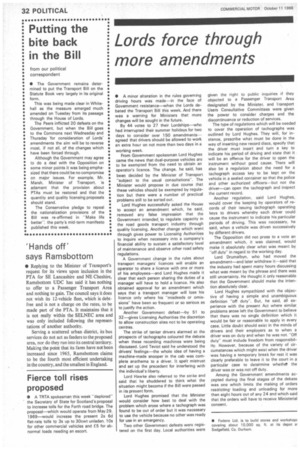Lords force through more amendments
Page 34

If you've noticed an error in this article please click here to report it so we can fix it.
• A minor alteration in the rules governing driving hours was made ---in the face of Government resistance—when the Lords debated the Transport Bill this week. And there was a warning for Ministers that more changes will be sought in the future.
By 44 votes to 27 their Lordships—who had interrupted their summer holidays for two days to consider over 150 amendments— agreed that drivers should be allowed to work an extra hour on not more than two days in a working week.
From Government spokesman Lord Hughes came the news that dual-purpose vehicles are to be exempted from the need to obtain an operator's licence. The change, he said, has been decided by the Minister of Transport "subject to the usual consultations". The Minister would propose in due course that these vehicles should be exempted by regulation but there were a number of practical problems still to be sorted out.
Lord Hughes successfully asked the House to accept an amendment which, he said, removed any false impression that the Government intended, to regulate capacity in the road goods transport industry through quality licensing. Another change which went through gives power to Licensing Authorities to inquire when necessary into a company's financial ability to sustain a satisfactory level of maintenance and observe other road safety regulations.
A Government change in the rules about transport managers' licences will enable an operator to share a licence with one or more of his employees—and Lord Hughes made it clear that each person sharing the duties of a manager will have to hold a licence. He also obtained approval for an amendment which says that a transport manager will lose his licence only where his "misdeeds or omissions" have been so frequent or so serious as to justify the action.
Another Government defeat—by 51 to 32—gives Licensing Authorities the discretion to allow construction sites not to be operating centres.
The strike of tanker drivers alarmed at the prospects of tachographs coloured the debate when these recording machines were being discussed. Lord Teviot said he understood the drivers' feelings—the whole idea of having a machine-made snooper in the cab was complete anathema to a driver. It spelt mistrust and set up the precedent for interfering with the individual's liberty.
Lord Hawke also referred to the strike and said that he shuddered to think what the situation might become if the Bill were passed in its present form.
Lord Hughes promised that the Minister would consider how best to deal with the problem which arose where a tachograph was found to be out of order but it was necessary to use the vehicle because no other was ready for use in an emergency.
Two other Government defeats were registered on the first day. Local authorities were
given the right to public inquiries if they objected to a Passenger Transport Area designated by the Minister, and I ransport Users Consultative Committees were given the power to consider charges and the discontinuance or reduction of services.
The type of regulations which will be needed to cover the operation of tachographs was outlined by Lord Hughes. They will, for instance, prescribe what must be done in the way of inserting new record discs, specify that the driver must insert and turn a key to indicate his period of driving and state that it will be an offence for the driver to open the instrument without good cause. There will also be a regulation about the need for a tachograph access key to be kept on the vehicle in a sealed container so that the police and other authorized officers-but not the driver—can open the tachograph and inspect the current record.
Another regulation, said Lord Hughes, would cover the keeping by operators of records of their issuing tachograph operating keys to drivers whereby each driver could cause the instrument to indicate his particular periods of driving. This was necessary, he said, when a vehicle was driven successively by different drivers.
The Opposition did not press to a vote an amendment which, it was claimed, would make it absolutely clear what was meant by -off duty" in regard to the working day.
Lord Drumalbyn, who had moved the amendment—and later withdrew it—said that the industry had spent many hours discussing what was meant by the phrase and there was still uncertainty. He thought it only reasonable that the Government should make the intention absolutely clear.
Lord Hughes sympathized with the objective of having a simple and unambiguous definition "off duty". But, he said, all experience with the present Act where similar problems arose left the Government to believe that there was no single definition which it would be fair or reasonable to apply in every case. Little doubt should exist in the minds of drivers and their employers as to when a driver was on duty and when he was not. "Off duty" must include freedom from responsibility. However, because of the variety of circumstances which might exist when the driver was having a temporary break for rest it was clearly preferable to leave it to the court in a particular case to determine whethdt the driver was or was not off duty.
Among the Government amendments accepted during the final stages of the debate was one which limits the making of orders restricting' loading and unloading for more than eight hours out of any 24 and which said that the orders will have to receive Ministerial consent.












































































































